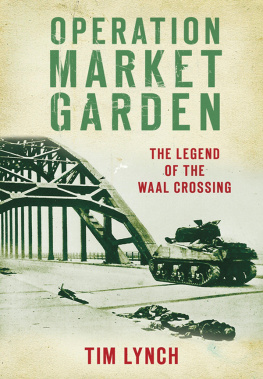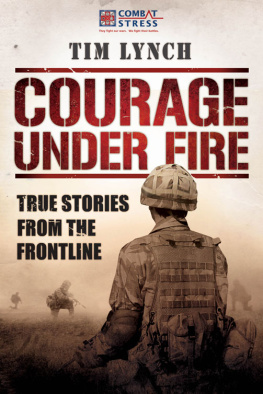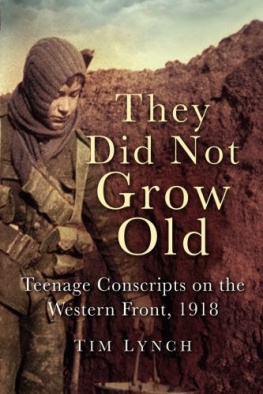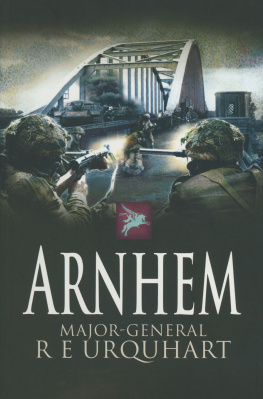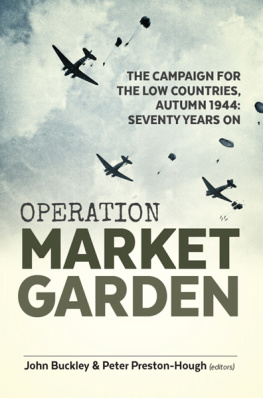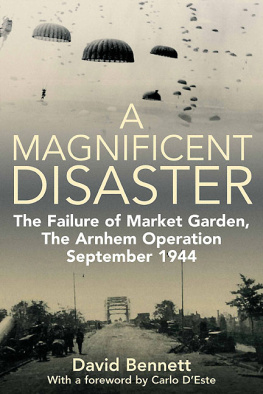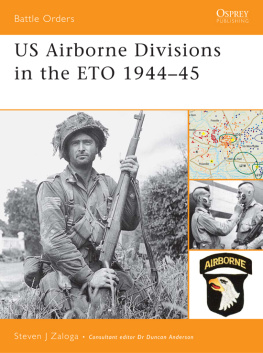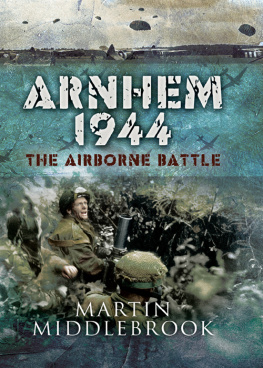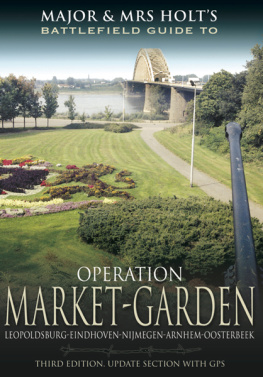OPERATION
MARKET
GARDEN
THE LEGEND OF THE WAAL CROSSING
TIM LYNCH

A great deal has been written and said about Operation Market Garden and there are many experts out there. I have been fortunate enough to be able to draw on both their work and their generosity. In particular I would like to thank Jan Bos for his kindness in providing photographs and material that I would otherwise have missed and which help to fill out the story. Readers with an interest in the subject will recognise the debt owed to Robin Neillands, whose myth busting approach to history sparked my own interest in the myths that have emerged from the campaign in Europe in 1944-45. Thanks also to Jon Cooksey, who first suggested I write about the crossing and to Shaun Barrington and the team at Spellmount who took up the idea.
As always, a special thank you to my wife Jacqueline and to Beth and Josh. They held the high ground so that ultimately I crossed the bridge and got the job done.
Author Tim Lynch served with the Army Air Corps in the Falkands and Northern Irleand, after which he returned to university. His studies led to his work in the development of responses to combat-related psychological readjustment problems among veterans. He is the author of numerous articles for magazines such as Military Illustrated, Armourer and Skirmish and the books Battlefield Archaeology (2007), Silent Skies (2008) and Dunkirk 1940: Whereabouts Unknown (2010).
First published in 2011 by Spellmount,
an imprint of
The History Press
The Mill, Brimscombe Port
Stroud, Gloucestershire, GL5 2QG
www.thehistorypress.co.uk
This ebook edition first published in 2016
All rights reserved
Tim Lynch, 2011
The right of Tim Lynch to be identified as the Author
of this work has been asserted in accordance with the
Copyrights, Designs and Patents Act 1988.
This ebook is copyright material and must not be copied, reproduced, transferred, distributed, leased, licensed or publicly performed or used in any way except as specifically permitted in writing by the publishers, as allowed under the terms and conditions under which it was purchased or as strictly permitted by applicable copyright law. Any unauthorised distribution or use of this text may be a direct infringement of the authors and publishers rights, and those responsible may be liable in law accordingly.
EPUB ISBN 978 0 7509 6311 4
Typesetting and origination by The History Press
eBook converted by Geethik Technologies
Contents
Preface
In the September 2009 edition of the US magazine World War II, an angry reader wrote to complain about its recent review of a ten-volume history of Germanys role in the Second World War. I have not read the 12,000 pages, he admitted, but I am guessing they did not even come close to the truth. I am guessing they left out the part where before going on to list various atrocities and concluding I am tired of people trying to rewrite history the way they see it. With a patience and diplomacy one can only admire, the reviewer pointed out that it was unnecessary to guess about its contents. The review includes several specific references to volumes in the series that present the Reichs atrocities in context and in detail. There are, unfortunately, many people out there searching for a reason to take offence. This book will be a critical goldmine for those readers who enjoy being upset when long cherished facts are challenged and who would rather assume a knowledge of history than acquire one.
History is a commodity like any other to be sold in books, documentaries and films to an audience who want to hear a story they can relate to. Fifty years after the end of the Second World War and at a time when Americas use of military might to enforce its foreign policy cast it on more questionable moral ground in the eyes of the international community, harking back to a time when it had fought a good war against an identifiably evil regime was a comfort. In an exchange in Brechts play The Life of Galileo, the character of Andrea claims, Unhappy the land that has no heroes, to which Galileo replies, No, unhappy the land that needs heroes. Whether America at that time needed heroes is a debate to be conducted elsewhere but whatever the truth, broadcast journalist Tom Brokaw provided a new form of hero worship when he coined the term The Greatest Generation (1998) to describe
Americas citizen heroes and heroines who came of age during the Great Depression and the Second World War and went on to build modern America. This generation was united not only by a common purpose, but also by common values duty, honor, economy, courage, service, love of family and country, and, above all, responsibility for oneself At a time in their lives when their days and nights should have been filled with innocent adventure, love, and the lessons of the workaday world, they were fighting in the most primitive conditions possible across the bloodied landscape of France, Belgium, Italy, Austria, and the coral islands of the Pacific. They answered the call to save the world from the two most powerful and ruthless military machines ever assembled, instruments of conquest in the hands of fascist maniacs. They faced great odds and a late start, but they did not protest. They succeeded on every front. They won the war; they saved the world.
Modestly proclaiming this group of Americans to be the greatest generation any society has ever produced, Brokaws approach proved immensely popular and celebrated a nostalgia for a time when national self esteem was high and the world was divided more easily into good and bad. His view of the isolationist stance many of that generation favoured and their reluctance to oppose the Nazi regime, or of the hundreds of thousands of American men who were investigated for dodging the draft is less clear but the popularity of the notion of the greatest generation quickly caught on. The book was followed almost immediately by Gerald Astors The Greatest War: Americans in Combat, 19411945 (1999) and an outpouring of veteran memoirs which escalated still further with the success of Steven Spielbergs television series Band of Brothers (2001). Based on Stephen Ambroses book of the same name, the series triggered an entire industry devoted to the memory of the 101st Airborne Division. Although never quite reaching the same mass audience, veterans of the 82nd Airborne followed suit. Soon, the paradigm spawned a mass market for military history aimed at the general reader that is now heavily slanted towards hagiographies lacking the will to question or analyse wisdom passed down from the exalted position of veteran status. In doing so, the war has become mythologized into a great moral crusade. As historian Michael C.C. Adams puts it:
All societies to some degree reinvent their pasts Sometimes we conjure up the past in such a way that it appears better than it really was. We forget ugly things we did and magnify the good things. This is wishful thinking, the desire to retell our past not as it was but as we would like it to have been. If the past is remoulded too drastically, it ceases to be real history Then, through repetition, people come to believe that this partial portrait is the whole landscape of history, and what is forgotten will be thought never to have existed. Such a process happened with World War II, which has been converted over time from a complex, problematic event, full of nuance and debatable meaning, to a simple, shining legend of the Good War. For many, including a majority of survivors from the era, the war years have become Americas golden age, a peak in the life of society when everything worked out and the good guys definitely got a happy ending. It was a great war. For Americans it was the best war ever.

